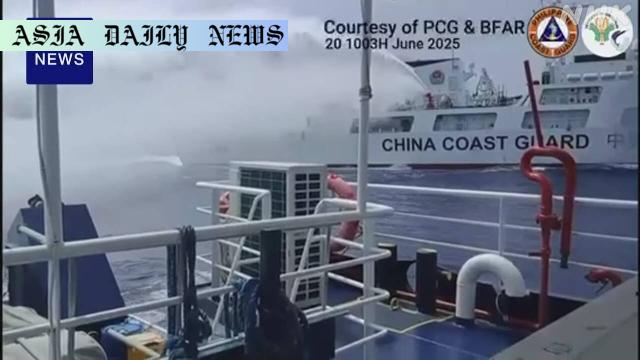Scarborough Shoal lies at the heart of escalating tensions in the South China Sea, as the Philippines accuses China’s Coast Guard of aggression.
Philippines accuses the Chinese Coast Guard of firing water cannons near Scarborough Shoal.
Incident involved four Philippine vessels delivering fuel to fishing boats.
China claims the vessels violated international and Chinese laws.
Scarborough Shoal is a disputed area within the Philippines’ exclusive economic zone.

Introduction: Escalating Tensions in the South China Sea
The South China Sea, a crucial maritime region in Southeast Asia, has once again become the focal point of international controversy. The Scarborough Shoal, located approximately 200 kilometers west of Luzon Island in the Philippines, has seen heightened tensions between the Philippines and China. Recently, the Philippine government accused China’s Coast Guard of employing aggressive tactics, including the use of water cannons, against its vessels. This incident has sparked concerns over the safety of maritime activities and the potential escalation of geopolitical disputes in the region.
The Incident: Water Cannons and Fuel Shipments
According to Philippine officials, the incident occurred near Scarborough Shoal, a location falling within the Philippines’ exclusive economic zone but effectively controlled by China. On Friday, four Philippine vessels from the Bureau of Fisheries and Aquatic Resources attempted to deliver fuel to local fishing boats in the area. As they approached, a Chinese Coast Guard ship reportedly blocked their passage and fired water cannons, forcing the Philippine vessels to retreat. A video released by Manila appears to show the Chinese ship using the powerful jet streams, creating a harrowing situation for the Filipino crew members.
The Philippine government has labeled this act as illegal, asserting that it violates both international law and the rights of Philippine maritime activities within its exclusive economic zone. Officials have called for accountability and have requested international attention to address the situation. Meanwhile, China’s Coast Guard defended their actions, claiming that Philippine vessels violated not only international guidelines but also Chinese national sovereignty over the disputed territory.
Scarborough Shoal: A Flashpoint of Contention
Scarborough Shoal, a small but strategically important reef, has been contested for years. Although it lies within the Philippines’ exclusive economic zone, China asserts control over the area, citing historical claims. In 2012, Chinese forces took control of the shoal, effectively barring Filipino fishermen from accessing the resource-rich waters. Beijing further consolidated its claim in 2022, when it unilaterally revised its territorial baselines to include Scarborough Shoal within its jurisdiction.
The Philippines, backed by a 2016 ruling by the Permanent Court of Arbitration that invalidated China’s claims, has consistently protested against Chinese activities in the region. However, China has refused to recognize the ruling. These ongoing disputes have strained diplomatic relations and drawn in other nations, especially the United States, which advocates for freedom of navigation in the South China Sea.
International Implications and Reactions
The incident at Scarborough Shoal is not an isolated event but part of a broader pattern of increasing maritime tensions in the South China Sea. The waterway serves as a critical global trade route, and territorial disputes among claimant countries—most notably China, the Philippines, Vietnam, and Malaysia—have raised concerns about stability in the region. The use of aggressive tactics, such as water cannons, sets a worrying precedent and poses risks to the safety of those navigating these waters.
While Manila has called on the international community for support, China continues to assert its expanding influence in the area, often employing military and paramilitary measures. The United States and its allies, including Japan and Australia, have conducted joint maritime exercises to counterbalance Chinese aggression. However, the lack of a unified global response further complicates efforts to address these disputes effectively.
Conclusion: The Path Forward
The situation at Scarborough Shoal underscores the urgent need for multilateral dialogue and conflict resolution mechanisms to prevent further escalation. Both the Philippines and China must engage in diplomacy to find common ground, as prolonged conflicts will only exacerbate tensions and risk potential clashes. Furthermore, the international community’s role in supporting a rules-based approach to maritime governance remains pivotal in ensuring peace and stability in the South China Sea.
As the Scarborough Shoal dispute unfolds, the world will watch closely, hoping for a peaceful resolution to an increasingly volatile situation.



Commentary
The Rising Importance of Maritime Security
The recent clash at the Scarborough Shoal highlights the growing importance of safeguarding maritime security and the challenges of territorial disputes. As a strategic location within the South China Sea, Scarborough Shoal’s significance goes beyond its immediate geographic bounds. It is not merely a matter of controlling a reef; rather, it represents the broader struggle for dominance in the region and the implications for international law. This incident serves as a reminder of why strong global frameworks governing maritime activities are necessary and why multilateral dialogue is so crucial in resolving such disputes.
The Role of International Accountability
China’s assertion of dominance over the Scarborough Shoal contrasts starkly with established international norms. The 2016 ruling by the Permanent Court of Arbitration, which invalidated China’s nine-dash line claims, is a powerful legal precedent. Yet, actions such as water cannon confrontations show a clear disregard for international mechanisms designed to protect weaker nations from the overreach of stronger powers. This highlights the critical need for the global community to hold parties accountable. Without consistent enforcement, such rulings risk becoming merely symbolic, further emboldening aggressive behavior.
The Potential for Diplomacy and Resolution
Despite the heated nature of the Scarborough Shoal dispute, diplomacy remains the most viable pathway forward. Both China and the Philippines have a vested interest in maintaining stability in the South China Sea, given its importance for trade and regional development. However, meaningful engagement will require compromises from all sides. Transparency, respect for international law, and multilateral involvement will be key in fostering an environment conducive to dialogue. As global citizens, we must advocate for peaceful resolutions to such conflicts, even amid rising tensions and nationalist fervor.